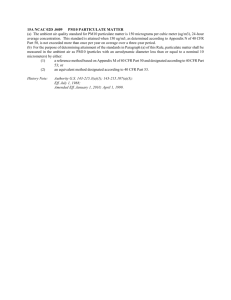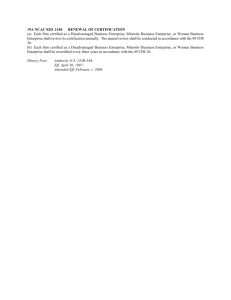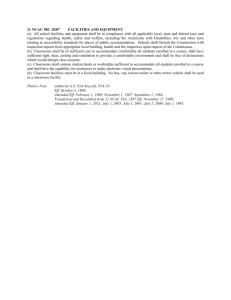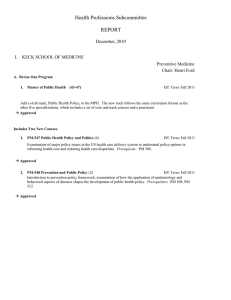T C ABLE OF ONTENTS
advertisement
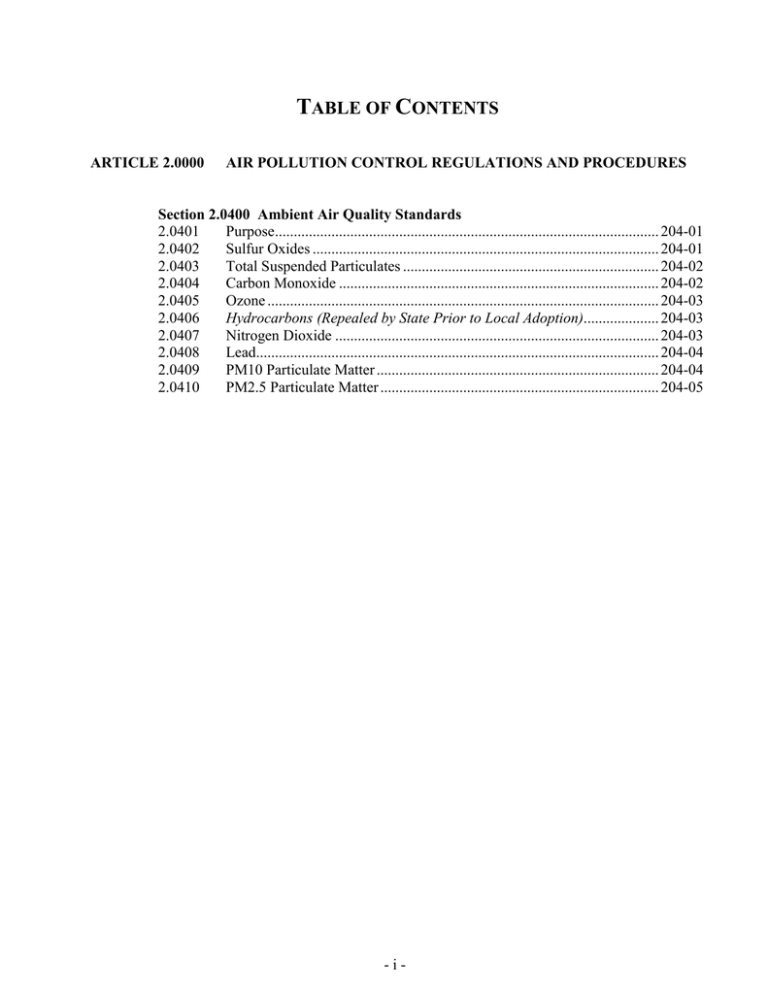
TABLE OF CONTENTS ARTICLE 2.0000 AIR POLLUTION CONTROL REGULATIONS AND PROCEDURES Section 2.0400 Ambient Air Quality Standards 2.0401 Purpose...................................................................................................... 204-01 2.0402 Sulfur Oxides ............................................................................................ 204-01 2.0403 Total Suspended Particulates .................................................................... 204-02 2.0404 Carbon Monoxide ..................................................................................... 204-02 2.0405 Ozone ........................................................................................................ 204-03 2.0406 Hydrocarbons (Repealed by State Prior to Local Adoption).................... 204-03 2.0407 Nitrogen Dioxide ...................................................................................... 204-03 2.0408 Lead........................................................................................................... 204-04 2.0409 PM10 Particulate Matter ........................................................................... 204-04 2.0410 PM2.5 Particulate Matter .......................................................................... 204-05 -i- SECTION 2.0400 AMBIENT AIR QUALITY STANDARDS 2.0401 PURPOSE (a) The purpose of the ambient air quality standards set out in this Section is to establish certain maximum limits on parameters of air quality considered desirable for the preservation and enhancement of the quality of the state’s air resources. Furthermore, the objective of the Commission, consistent with the North Carolina Air Pollution Control Law, shall be to prevent significant deterioration in ambient air quality in any substantial portion of the state where existing air quality is better than the standards. An atmosphere in which these standards are not exceeded should provide for the protection of the public health, plant and animal life, and property. (b) Ground level concentrations of pollutants will be determined by sampling at fixed locations in areas beyond the premises on which a source is located. The standards are applicable at each such sampling location in the state. (c) No facility or source of air pollution shall cause any ambient air quality standard in this Section to be exceeded or contribute to a violation of any ambient air quality standard in this Section except as allowed by MCAPCO Regulations 2.0531 - “Sources in Non-Attainment Areas” or 2.0532 - “Sources Contributing to an Ambient Violation”. History Note: Statutory Authority G.S. 143-215.3(a)(1);143-215.107(a)(3); Eff. February 1, 1976; Amended Eff. December 1, 1992; October 1, 1989; July 1, 1984. 2.0402 SULFUR OXIDES (a) The ambient air quality standards for sulfur oxides measured as sulfur dioxide are: (1) 80 micrograms per cubic meter (0.03 p.p.m.) annual arithmetic mean, (2) 365 micrograms per cubic meter (0.14 p.p.m.) maximum 24-hour concentration not to be exceeded more than once per year, (3) 1300 micrograms per cubic meter (0.5 p.p.m.) maximum three-hour concentration not to be exceeded more than once per year. (b) Sampling and analysis shall be in accordance with procedures in Appendix A 40 CFR Part 50 or equivalent methods established under 40 CFR Part 53. History Note: Statutory Authority G.S. 143-215.3(a)(1); 143-215.107(a)(3); Eff. February 1, 1976; Amended Eff. July 1, 1984; December 1, 1976. 204-1 MCAPCO 12/15 2.0403 TOTAL SUSPENDED PARTICULATES (a) The ambient air quality standards for total suspended particulate matter are: (1) 75 micrograms per cubic meter annual geometric mean, and (2) 150 micrograms per cubic meter maximum 24-hour concentration not to be exceeded more than once per year. (b) Sampling and analysis shall be in accordance with procedures in Appendix B of 40 CFR Part 50 or equivalent methods established under 40 CFR Part 53. History Note: Statutory Authority G.S. 143-215.3(a)(1); 143-215.107(a)(3); Eff. February 1, 1976; Amended Eff. July 1, 1988; July 1, 1984; October 15, 1981. 2.0404 CARBON MONOXIDE (a) The ambient air quality standards for carbon monoxide are: (1) 9 parts per million (10 milligrams per cubic meter) maximum eight-hour average concentration not to be exceeded more than once per year, (2) 35 parts per million (40 milligrams per cubic meter) maximum one-hour average concentration not to be exceeded more than once per year. (b) Sampling and analysis shall be in accordance with procedures in Appendix C 40 CFR Part 50 or equivalent methods established under 40 CFR Part 53. (c) An eight-hour average shall be considered valid if at least 75 percent of the hourly averages for the eight-hour period are available. In the event that only six or seven hourly averages are available, the eight-hour average shall be computed on the basis of the hours available using six or seven as the divisor. (d) When summarizing data for comparison with the standards, averages shall be stated to one decimal place. Comparison of the data with the levels of the standards in parts per million shall be made in terms of integers with fractional parts of 0.5 or greater rounding up. History Note: Statutory Authority G.S. 143-215.3(a)(1); 143-215.107(a)(3); Eff. February 1, 1976; Amended Eff. October 1, 1989; July 1, 1984; December 1, 1976. 204-2 MCAPCO 12/15 2.0405 OZONE The ambient air quality standard for ozone measured by a reference method based on Appendix D of 40 CFR Part 50 and designated according to 40 CFR Part 53 is 0.08 parts per million (ppm), daily maximum 8-hour average. The standard is attained at an ambient air quality monitoring site when the average of the annual fourth-highest daily maximum 8-hour average ozone concentration is less than or equal to 0.08 ppm as determined by Appendix I of 40 CFR Part 50, or equivalent methods established under 40 CFR Part 53. History Note: Authority G.S. 143-215.3(a)(1); 143-215.107(a)(3); Eff. February 1, 1976; Amended Eff. April 1, 1999; July 1, 1984; July 1, 1979; December 1,1976. 2.0406 HYDROCARBONS (REPEALED BY STATE PRIOR TO LOCAL ADOPTION) 2.0407 NITROGEN DIOXIDE (a) The ambient air quality standard for nitrogen dioxide is 0.053 parts per million (100 micrograms per cubic meter) annual arithmetic mean. (b) Sampling and analysis shall be in accordance with procedures in Appendix F 40 CFR Part 50 or equivalent methods established under 40 CFR Part 53. (c) The standards are attained when the annual arithmetic mean concentration in a calendar year is less than or equal to 0.053 parts per million, rounded to three decimal places (fractional parts equal to or greater than 0.0005 parts per million are round up). To demonstrate attainment, an annual mean must be based on hourly data that are at least 75 percent complete or on data derived from manual methods that are at least 75 percent complete for the scheduled sampling days in each calendar quarter. History Note: Statutory Authority G.S. 143-215.3(a)(1); 143-215.107(a)(3); Eff. February 1, 1976; Amended Eff. October 1, 1989; July 1, 1984; December 1, 1976. 204-3 MCAPCO 12/15 2.0408 LEAD The ambient air quality standard for lead and its compounds, measured as elemental lead by a reference method based on Appendix G of 40 CFR Part 50 or by an equivalent method established under 40 CFR Part 53, is 0.15 micrograms per cubic meter. The standard is met when the maximum arithmetic three month mean concentration for a three year period, as determined in accordance with Appendix R of 40 CFR Part 50, is less than or equal to 0.15 micrograms per cubic meter. History Note: Statutory Authority G.S. 143-215.3(a)(1); 143-215.107(a)(3); Eff. June 1, 1980; Amended Eff. January 1, 2010; July 1, 1984. 2.0409 PM10 PARTICULATE MATTER (a) The ambient air quality standards for PM10 particulate matter are: (1) 150 micrograms per cubic meter (ug/m3), 24-hour average concentration; and (2) 50 micrograms per cubic meter (ug/m3), annual arithmetic mean. These standards are attained when the annual arithmetic mean concentration is less than or equal to 50 ug/m3, and when the 99th percentile 24-hour concentration is less than or equal to 150 ug/m3, as determined according to Appendix N of 40 CFR Part 50. (b) For the purpose of determining attainment of the standards in Paragraph (a) of this Regulation, particulate matter shall be measured in the ambient air as PM10 (particles with an aerodynamic diameter less than or equal to a nominal 10 micrometers) by: (1) a reference method based on Appendix M of 40 CFR Part 50 and designated according to 40 CFR Part 53; or (2) an equivalent method designated according to 40 CFR Part 53. History Note: Authority G.S. 143-215.3(a)(1);143-215.107(a)(3); Eff. July 1, 1988; Amended Eff. April 1, 1999. 204-4 MCAPCO 12/15 2.0410 PM2.5 PARTICULATE MATTER (a) The national primary ambient air quality standards for PM2.5 are 12.0 micrograms per cubic meter (µg/m3) annual arithmetic mean concentration and 35 µg/m3 24-hr average concentration measured in the ambient air as PM2.5 (particles with an aerodynamic diameter less than or equal to a nominal 2.5 micrometers by either: (1) A reference method based on appendix L to 40 CFR Part 50 and designed in accordance with 40 CFR Part 53; or (2) An equivalent method designated in accordance with 40 CFR Part 53. (b) The primary annual PM2.5 standard is met when the annual arithmetic mean concentration, as determined in accordance with appendix N of 40 CFR Part 50, is less than or equal to 12.0 µg/m3 (c) The primary 24-hour PM2.5 standard is met when the 98th percentile 24-hour concentration, as determined in accordance with appendix N of 40 CFR Part 50, is less than or equal to 35 µg/m3. State History Note: Authority G.S. 143-215.3(a)(1); 143-215.107(a)(3); Eff. April 1, 1999. Amended Eff. September 1, 2015, January 1, 2010 MCAQ History Note: Amended Eff. December 15, 2015 204-5 MCAPCO 12/15 204-1 MCAPCO
